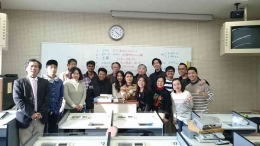By Sudirman, M.Pd., M.TESOL
The debates and discussions on how the process of language mastery seems never to finish. These discussions and debates lead us to critically think whether; (1) language ability can be possessed naturally since it is an innate ability of every human being, (2) language ability can be gained only by learning it formally, (3) language can be learned through the exposure to a particular language, or (4) it can be learned by using all ways above.
These issues are very important in language classroom pedagogy, and a complete understanding of the way human beings learn a language will help teachers to decide the appropriate methodologies and/or practices for their students in order to create a good language pedagogy. To my opinion, language ability ideally can be achieved through the process of acquiring and learning based on the objectives contexts.
Mitchell and Myles (2001) raise the issue of nature-nurture debate; this term is pertaining to the process of studying language as mentioned above. They question if all human beings are awarded language innate predisposition, they must be able to learn various languages easily as long as they want to. Conversely, if language can be learned only from exposure to that language, then people will learn their L2 in the same way as their L1.
Another question is how if the environment of L1 is different from L2? In line with Mitchell and Myles (2001), Harmer's (2007) concern on the underpinning conception of language teaching methodologies evokes a big question of whether someone can gain language ability through learning or acquiring.
These questions cannot be easily answered; there should be many things to be taken into account before answering them. However, he explains that all children acquire language as they grow up, they do not learn it consciously and even they are not taught language. Some adults also get their language ability in the same way as children do; they just pick up the language without studying it formally, but many adults learn language consciously by attending formal language lessons.
Widdowson (2003) confirms that everybody has her/his own way of learning a language, and the way might be different from one another and might be in different contexts and circumstances.
Referring to the E-Language linguistic term, proposed by Chomsky, Widdowson (2003) suggests that language learning should be actualized in the social process, and he adds that learners learn language through interaction and communication, the interaction may occur between a learner and learners and/or between learners and teachers. Therefore, language learning is closely interrelated with social practice.
To sum up, people obtain their language ability in different ways. The ways can be grouped into acquiring or learning. Learning is more in a formal setting such as attending a language course or learning a language in school.
While, acquiring language is usually through interacting and mingling with other people who speak the target language, through this way, people learn a language unconsciously. In relation to my context of English language pedagogy, since English is a foreign language and the students are not much exposed to it, the approach or method of language learning will be much better to be set in a social setting. Students should be given much time to communicate with their friends as well as with the teachers and the lesson also should be related to their actual life.










